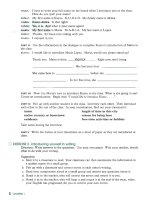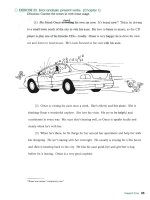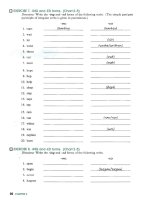Fundamentals of english grammar third edition part 42 ppt
Bạn đang xem bản rút gọn của tài liệu. Xem và tải ngay bản đầy đủ của tài liệu tại đây (414.35 KB, 7 trang )
EXERCISE
36.
Making cornparlsons. (Chapter
9)
,
,$
?.
, ,
F
:
.
py.r
.
:
.
.
a
,, ,
,
.,
.
~ ~
,
.
.
.,
Direcrias:
Do you have sayings in your language that are similar o or &e s'aeas ttie
following English proverbs?
.
,>
1.
Don't count your chickens before
r~
,.,.
s,.
4
-
The early bird gets the worm.
Too many cooks spoil the broth.
4.
A
bird in the hand is worth two in the bush.
-"
5.
A
stitch in time saves nine.
6.
When in Rome, do as the Romans do.
7.
Birds of a feather flock together.
8.
A
rolling stone gathers no moss.
EXERCISE
37.
Making comparisons. (Chapter
9)
Direceiom:
Write a composition based on one of the following topics.
d.
'
.!.
Compare and contmst:
.,:
.
.I
.,
.
1. being single and being mamed.
b:,
.
2.
cities you have lived in or have visited.
3.
diierent schools you have attended.
4.
your way of lie before and after you became a parent.
5.
yourself now to yourself ten years ago.
6.
your country now to your country 100 years ago.
,%
;$?
7.
life today to life 100 years
hrn
now.:;.
d,i
,d' ::
.
,
P.rp
:+
:
.;
8.
two sports.
9.
the seasons of the year.
10. food in two countries.
Comparisons
275
I
CONTENTS
10-1 Active sentences and passive sentences
10-2 Form of the passive
10-3 Transitive and intransitive verbs
10-4 Using the by-phrase
10-5 The passive forms of the present and
past progressive
10-6 Passive modal auxiliaries
10-7
Using past participles as adjectives
(stative passive)
10-8
Participial adjectives:
-ed
vs.
-ing
10-9
Get
+
adjective;get
+
past participle
10-10 Using
be
usedlaccustomed
to
and
get usedlaccustomed to
10-1 1 Used
to
vs.
be
used
to
10-12 Using be
supposed
to
(a)
~cm:
The mouse
a&
the cheese.
(a) and
(b)
have the same meaning.
@)
PASSIVE:
The cheese
rws
eaten
by the mouse.
ACTIVE
PASSIVE
ACTIVE:
S
0
mailed
I
the
package.
1
In
(c): The object in an active sentence becomes the
subject
in
a passive sentence.
PASSIVE:
/
\
S
by
+
0
(d)
1
The
package
was
mailed
ibyBob.l
In (d): The subject in
an
active sentence is the object
of
6y
in the byphrase in a passive sentence.
I
sucpLe
PReSBNT
I
Farmers
grow
corn.
r
Corn
is
grown
by farmers.
I
BE
+
PAST
PARTICIPLE
Corn
is
grown
by farmers.
Sara
was
w+ed
by the news.
(c) The report
will
be
written
by
Mary.
SIMPLE
PAST
The news
suwrissd
Sara.
Sara
was
surprised
by the news.
I
Form of all passive verbs:
be
+
past
panin'ple
Be
can be
in
any of its forms:
am,
is,
are,
was,
were,
has
been,
have
been,
will
be, etc.
PRESENT
PERFECT
Jack
has
mailed
the letter.
,
The letter
has
been mailed
by Jack.
ACTTVE
PASSIVE
1
EXERCISE
1.
Active
vs.
passive. (Charts 10-1
and
10-2)
Directions:
Change the active verbs to passive verbs. Write the subject of the passive sentence.
1.
SIMPLE PRESENT
(a) The teacher
helps
me.
(a)
I
ow
helped
by the teacher.
FUTURE
(b)
The teacher
helps
Jane.
Mr.
Lee
willplan
the meeting.
r
The meeting
will
be planned
by
Mr.
Lee.
Sue
is
going
to
write
the report.
-
The report
ia
going
to
be
written
by Sue.
(c) The teacher
helps
us.
(b)
-lahC
is
h~lprd
by the teacher.
(4 by the teacher.
2.
SIMPLE
PAST
(a) The teacher
helped
me.
(a) by the teacher.
@)
The teacher
helped
them.
b)
by the teacher.
3.
PRESENT
PERFBCT
(a) The teacher
has helped
Joe.
(a) by the teacher.
(b)
The teacher
has helped
us.
(b)
by the teacher.
4.
mrruRB
d
(a) The teacher
will
help
me.
(a) by the teacher.
(b)
The teacher
is
gmng
to
help
Tim.
(b)
by the teacher.
,
',',
.,
.
,
y
I
',!
.
The
Passlve
277
EXERCISE 2. Form
of
the passive. (Charts 10-1 and 10-2).
~irenio&
Change the verbs to the passive. Do not change the tense.
,
1
PAST
:I,
,~'.<.,~
'.>
.
BE
+
PARTXCIPLE
1.
Bob
mailed
the The package
was
wailed
by Bob.
package.
2.
That company Many people by that company.
employs
many
people.
3.
That company
has hired
Sue.
Sue by that company.
4.
The secretary
is
The letters by the secretary.
going to fax
the
letters.
5.
A college student My old car
by a college student.
bought
my old car.
6.
MIS.
Adams
will
The work by
MIS.
Adams.
do
the work.
7.
MI. Fox
washed
The windows by
Mr.
Fox.
the windows.
,
i.i!.>.i
ma
EXERCISE
3.
Active
vs.
passive. (Charts 10-1 and 10-2)
Directions:
Change the sentences from active
to
passive.
'
'':
'
,
1.
Ms. Hopkins invited me to dinner.
-t
I
was invited
to
dinner
by
Ms.
Hopkins.
,-
*>i
2.
Thomas Edison invented the phonograph.
*ii.~2
3.
Water surrounds an island.
4.
A plumber is going to
fix
the leaky faucet.
5.
A doctor has examined the sick child.
6.
A
large number of people speak Spanish.
7.
Helicopters fascinate children.
8.
Shakespeare wrote
Hamlet.
9.
This news will amaze you.
278
CHAPTER
10
EXERCISE
4.
Actlve
vs.
passive: question forms. (Charts 10-1 and 10-2)
Directions:
Change the active sentences to passive sentences that have the same meaning
and tense.
\
"-\,"a
Ac-
.
.r
PASSIVE
1.
(a) The news surprised John.
10h
w&
sw~vised
by the news.
(b)
Did the news surprise you?
Urve
vok
S~PV~SPA
by the news?
2.
(a) The news surprises
Erin.
by the news.
(b)
Does the news surprise you?
by the news?
3.
(a) The news will shock Steve.
by the news.
@)
Will
the news shock Pat?
by the news?
4.
(a)
Liz
signed the petition. by
Liz.
(b)
Did Ryan sign it? by Ryan?
PETITION
We,
thl undmslonad, bliw
that
the
hw-
n
3206
Tm
Stm
if
en
hlmxic bulldlng.
WI
bii~ that It ahwld
not
be
danmyed in
x
to
build
a
fn.fwd
rpuunnt
at
the
l&n.
1
I/
5.
(a) Bob has signed the petition. by Bob.
(b) Has Jim signed it yet? by Jim yet?
6.
(a) Sue is going to sign it.
by Sue.
(b)
Is Carol going to sign it?
by Carol?
EXERCISE
5.
Actlve
vs.
passlve. (Charts 10-1 and 10-2)
Directions:
Change the sentences from active to passive.
.
.
;<*fX.,''
,,
.!
,
.,!
1.
A
thief stole
Ann's
purse.
+
Ann's
purse
was
smkn
by
a
thief.
,
,
~;
\,,,
,
,,
,
:
'
.
,.,
. .
!
2.
Did a cat
kill
the bird?
.~.
,,
!
:'?'
.
3.
My cat didn't kill the bird.
,
'
,;,!':.,.
,~<
'
,
,
4.
Do a large number of people speak French?
:
,
,L,
,
r.;
5.
Is the janitor going to
fix
the window?
6.
Will a maid clean our hotel room?
,,
.,
,>.
,,:
.,.,
,
'
/I
I'
7.
Does the hotel provide clean towels?
.
.,
8.
Sometimes my inability to understand spoken English frustrates me.
The
Posslve
279
EXERCISE
6.
Active vs. passive. (Charts
10-1
and
10-2)
Directim:
Change the passive sentences to active. Keep the same tense.
Some of the
-
sentences are questions.
1.
Was the riot stopped by the police?
+
Did
the police
srqp
the riot?
2.
My suitcase was inspected by a customs officer.
3.
Love and understanding
are
needed by all children.
4.
Were you taught to read by your parents?
5.
I
was taughqto read by my parents.
6.
Are we going to be met at the train station by your cousin?
7.
Have the plans for the new hospital already been
drawn
by
,.I
'It
the architect?
8.
The bear was chased up a tree by a dog.
(a)
TRAN~~~
8
Bob
Mr. Lee
A
cat
Co)
-s-
S
An
accident
Kate
I
v
0
maikd the lemr.
signed the check.
killed the
bird.
v
happened.
came
to our house.
slept
well last night.
A
rranritive
verb is a
verb
that is followed by
an
object.
An
object is a noun or a pronoun.
An
innansiriw
verb is a verb that is not followed by
an
object.
agree die happen
rise
stand
appear
exist
lawh seem StqY
arrive fan live sit talk
become
flm
occur sleep wait
come
go
min
sneeze
walk
(c)
TRANsmVERBs
ACTIVE:
Bob
mailed
the letter.
PASSIVE: The lener
was
maU
by Bob.
(d)
INTRANSrnEVBBsS
ACTIVE:
An
accident
happened.
PAS^:
(nor
possible)
(e)
INCORRBCT:
An accident was happened.
Only aansitive verbs can be used
in
the passive.
An
intransitive verb is
NOT
used
in
the passive.
'To
find out
if
a
verb is transitive or inuansitiw, look in you dictionary. The
usual
abbrcviationa are v.t. (mnsitive) and v.i.
(intransitive).
Some
verbs
have both rrmitive and inrransitive uaes. For
example:
rransitive: Sncdmu
smdy
bwh.
inrransitive:
Studsnn
rmdy.
280
CHAPTER
10
!CISE
7.
Transltlve
vs.
Intransitive
verbs. (Chart
10-3)
$
Direcrions:
h&&g
the verbs and identify
them
as transitive
Change
the sentences to the passive if possible.
;,
.
ii>;r~~
is
I.,,
,,
.
.A
L
.
,,.
.
.
;,>?-;,."
,I:;
v.1.
1.
Jack
dkd
to school yesterday.
(no change)
,
.
v.k
,ti
Pi
.,
I
.,.j
I
2.
Susie
bEnbP
the
window.
.!,
.
-t
The
window
was
broken
by
Susie.
~,.
.,,,
3.
We stayed
in
a hotel.
4.
The leaves fell to the ground.
,.
;
$,:
~
.
"'
5.
1
slept at
my
friend's house last night.
6.
An
accident happened at the corner of Third and Main.
,
,
,
:
i
"
?
Did the Koreans
invent
gunpowder?
In
the fairy tale, a princess kissed a
hg.
%.
$! ,
;
*
,:'L&
"
,>
q@>,
7
.*p
:,y
,
.
I
. I.'
$
1;
~. .
'
_
,
L
'AIDS
=
a
disease
(Auto
Immune
Deficiency
Syndrome).
The
Passive
281









